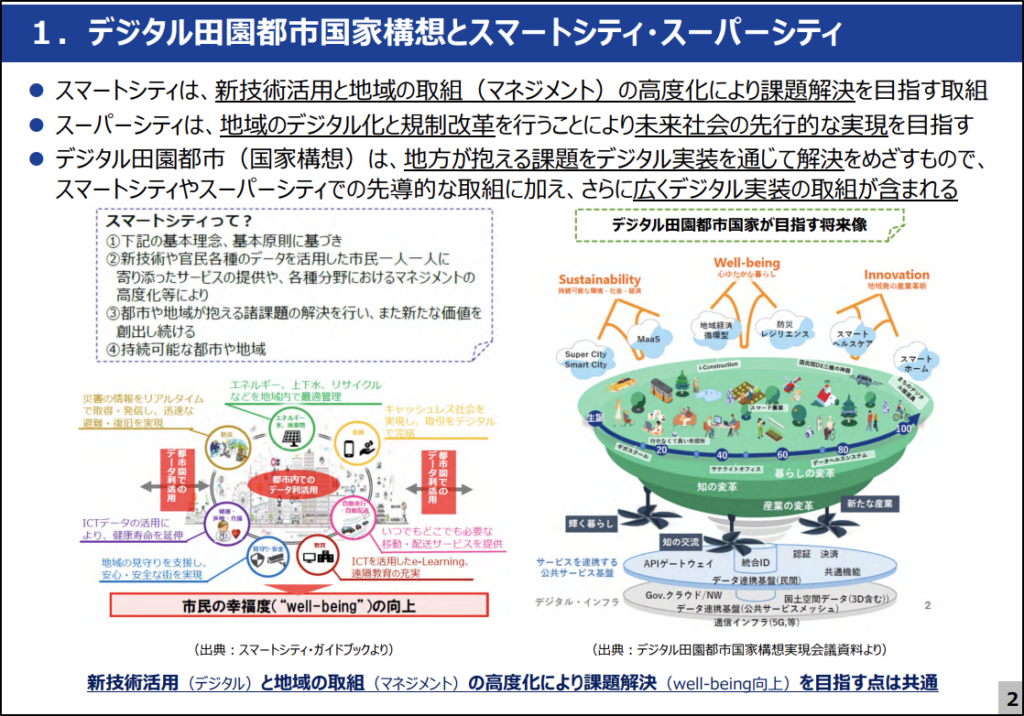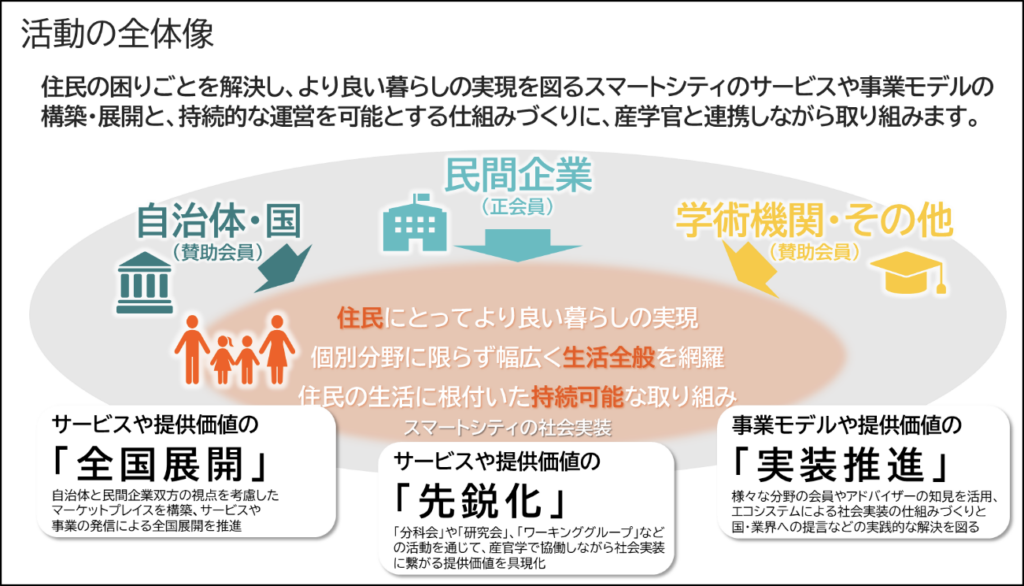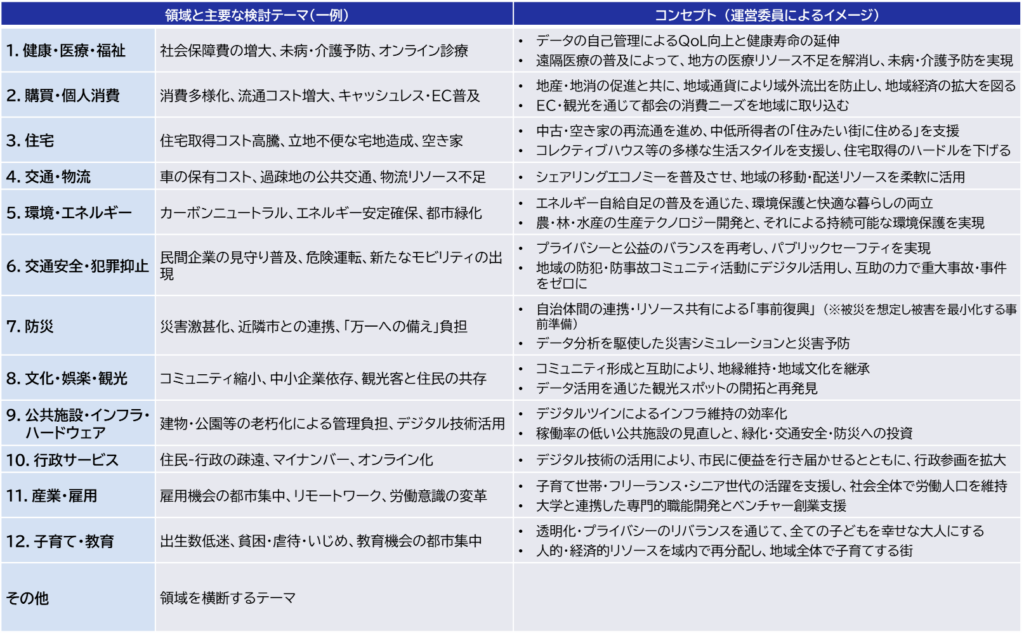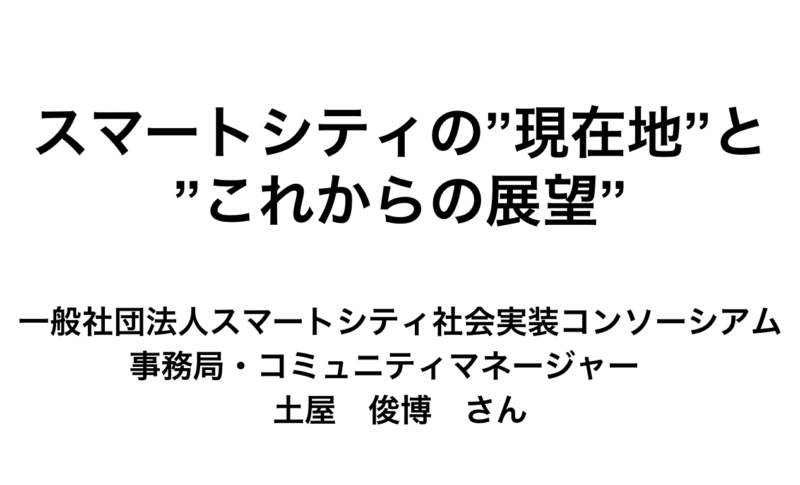Introduction:
The Smart City Social Implementation Consortium, a general incorporated association, is working on the social implementation of smart cities in each region. In order to collect and link the "data" that is essential for smart cities, further development and utilization of communication technology will be essential. Community manager Mr. Tsuchiya talked about the "current location" and "future prospects" of smart cities. We spoke to Mr.
●Person who answered

Smart City Social Implementation Consortium
Secretariat/Community Manager
Mr. Toshihiro Tsuchiya
About smart cities
Secretariat:First of all, Mr. Tsuchiya, please introduce yourself.
(I.e.: This is Toshihiro Tsuchiya. I was in charge of corporate planning and business planning at an electronics manufacturer for more than a decade, and then from June 2019 I was in charge of "smart city policy" at the Cabinet Office Science, Technology and Innovation Promotion Secretariat. Since June 6, he has been working as the secretariat and community manager of the Smart City Social Implementation Consortium, a general incorporated association, where he is involved in promoting smart cities and providing smart city advisory services to local governments. In addition, he is also active as a Smart City Institute (SCI-J) fellow, a small and medium-sized business consultant, and civic tech.
Secretariat:You have a distinctive look today.
(I.e.:The term "smart city" is often perceived as formal. I call myself ``Sushi'', an abbreviation of ``Smart City'', and I am a ``Sushi-ya'' (a person who works on smart cities), and I often appear at events as a sushi chef. I am.
Secretariat: Now, getting to the main topic, I have heard the term "smart city" more and more frequently over the past three or four years. What kind of thing is it?
(I.e.: To put it very simply, a smart city is the use of new technology in urban development. Each city has its own definition of smart city, but the common definition is set by the Cabinet Office.
・By providing services that are tailored to each citizen by utilizing new technologies such as ICT and various public and private data, and by increasing the sophistication of management (planning, maintenance, management, operation, etc.) in various fields [Means]
・Solve various issues faced by cities and regions and continue to create new value [Operations]
・Sustainable cities and regions, places where Society 5.0 can be realized in advance [state]
It is said to be about.
Secretariat:Why are "smart cities" needed?
(I.e.:Japan's population has been decreasing since reaching its peak in 2004. According to predictions based on various statistics, the working-age population between the ages of 15 and 64 will increase from the current 7,449 million people (2020) to around 2060 million people in 4,793. It becomes a situation where two people have to do it together. As the number of workers decreases, the challenge is how to maintain the region. Against this background, people may say, ``I want to maintain a livable society and region even as the population declines.To do that, I want to effectively use new technologies and methods.''
The 2021th Science, Technology and Innovation Basic Plan, which was approved by the Cabinet in XNUMX, states that it is ``creating cities and regions that will serve as a foundation for the next generation (promotion of smart cities)''. I think we need to be conscious of promoting ``urban development'' and ``regional development'' that our children born in Japan would like to carry on.
Secretariat:thank you. Are smart city initiatives spreading to various regions?
(I.e.:I agree. The recently talked-about ``Digital Garden City Nation Plan'' is promoting smart city and super city initiatives. About 400 related projects are already underway. In addition, digital implementation and the development of city OS and data linkage infrastructure are progressing across the country, making use of grants from the Digital Garden City Nation Initiative. Additionally, the Cabinet Office's "Smart City Reference Architecture" was revised in August 2023, and consideration is also underway in the "Strategic Innovation Program Third Phase (SIP Third Phase)."

(Source: Economic and Fiscal Policy Council Integrated Economic and Fiscal Reform Promotion Committee National and Local Systems Working Group 31st Meeting Material 3-1 (Cabinet Office Presentation Material P.2))
https://www5.cao.go.jp/keizai-shimon/kaigi/special/reform/wg6/20220419/pdf/shiryou3-1.pdf
About the consortium's efforts
Secretariat:What kind of activities does the Smart City Social Implementation Consortium, to which you belong, engage in?
(I.e.:As I mentioned earlier, smart cities and digitalization are being promoted in various places. However, in order to move from "demonstration to implementation", it is necessary to consider the "business model". To this end, we need an ecosystem of public-private collaboration that transcends local government/private, industry/region boundaries, and we have created a consortium as a framework for promoting the social implementation of digital technology. Professor Noboru Koshizuka of the Graduate School of Interdisciplinary Information Studies at the University of Tokyo, who has been studying the "reference architecture" for smart cities, will serve as the representative director, and is currently working with over 150 companies, local governments, universities and other research institutes, and central government agencies. We are participating.
Secretariat:thank you. A variety of private companies are participating across industries.
(I.e.: Yes, we have a wide variety of people participating, not just from a specific corporate group. Our activities include collaboration between industry, academia, and government to ``build and develop smart city services and business models that solve residents' problems and realize a better life, and create a system that enables sustainable operation.'' In order to address these issues, we will ``develop services and value provided nationwide'' by building a marketplace, etc., ``improve our services and value provided through subcommittee and study group activities,'' and ``build business models and value by leveraging the knowledge of our members and advisors.'' We are currently working on "promoting the implementation of the value provided."

Secretariat: How are you proceeding with the implementation of smart cities?
(I.e.: ``Creating a smart city'' can be difficult to understand, so we are focusing on ``creating specific services'' in order to run the entire smart city ecosystem. I would like to continue the cycle of ``planning'' to share a vision and consider services to solve problems, ``development'' of services, ``implementation'' through co-creation between local governments and businesses, and ``deployment.'' I believe there is something we can do to help in each phase. After all, I have the impression that ``planning'' is the most important thing, and ``discovering local issues'' is extremely important. We conduct "field research" to learn about real issues in the region, and work with member companies to develop specific services. We have listened to various local governments and organized 12 fields in the smart city area as examples of concepts. This is just one example, but we use this as a springboard for a wide range of discussions.


Regarding the relationship and expectations between smart cities and communications
Secretariat:Please tell us about the relationship between smart cities and communications.
(I.e.:I think communication has four roles in a smart city. The first point is the utilization of the data acquired from the "smart city assets (devices that acquire data such as sensors)" referred to in the "reference architecture" when linking it to the city OS. The second point is the use of smart city services to deliver them to residents, businesses, tourists, and other users. The third point is how users can digitally engage in smart city management and decision-making. The fourth point is to utilize it for "interoperability and collaboration with other regions and other systems." Additionally, while it is possible to receive face-to-face services in urban areas, this may not always be the case in rural areas or remote islands. There may also be a way to hold it.
Secretariat:What will smart city initiatives look like in the future?
(I.e.: In order to build future smart cities, I believe that society as a whole needs to create a "smart city roadmap" from a medium- to long-term perspective, looking ahead to around 2030. If we focus on ``local sustainability,'' ``improving well-being,'' and ``economic revitalization,'' we will be able to visualize information about the city, develop platforms for creating new services, and develop smart technologies. I think we need to move forward with Citi's exports, overseas expansion, and human resource development. Beyond 5G/6G will also be realized around 2030, so it would be great if "smart cities" and "Beyond 5G/6G" can be strategically linked toward 2030.
Secretariat:If next-generation communications are widely provided as ``commonplace infrastructure'' in both urban and rural areas, it will lead to the provision of advanced services in various fields and enrich people's lives. I think it is. Thank you for your time today.


